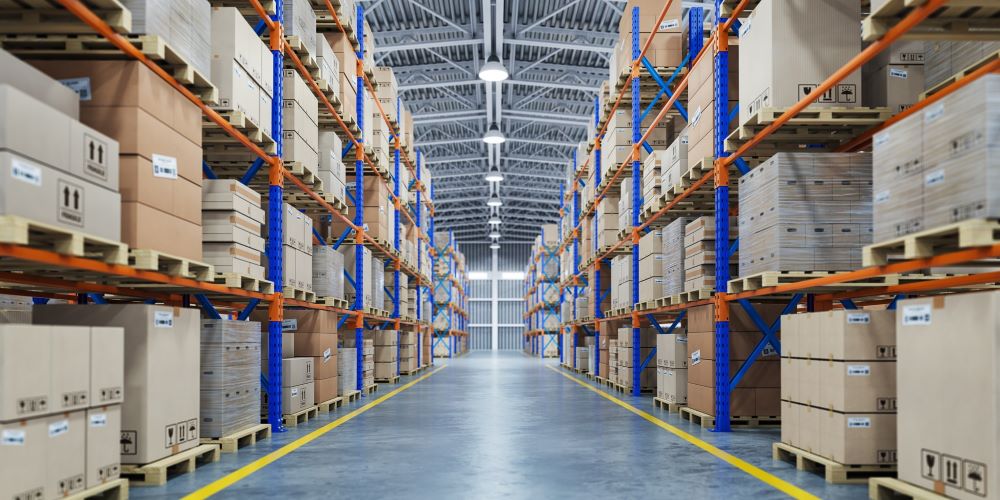Leveraging Third-Party Logistics (3PL) as a Winning Partnership
%20as%20a%20Winning%20Partnership-1%20(1).jpg?width=952&height=635&name=Leveraging%20Third-Party%20Logistics%20(3PL)%20as%20a%20Winning%20Partnership-1%20(1).jpg) In the dynamic arena of eCommerce, the process of order fulfillment has evolved from a logistical obligation to a fundamental element of a successful business strategy. In this in-depth article, we explore the multifaceted world of third-party logistics (3PL), the benefits of 3PL warehousing, and how effective inventory management can make or break your fulfillment process.
In the dynamic arena of eCommerce, the process of order fulfillment has evolved from a logistical obligation to a fundamental element of a successful business strategy. In this in-depth article, we explore the multifaceted world of third-party logistics (3PL), the benefits of 3PL warehousing, and how effective inventory management can make or break your fulfillment process.
What is a third-party logistics (3PL) provider?
Third-party logistics, often abbreviated as 3PL, is a term applied to outsourced logistics services that focus on managing various supply chain operations. These services range from handling specific elements like transportation or warehousing to offering a comprehensive solution for the entire supply chain management.
3PL providers, or freight forwarders, serve as pivotal allies in a business's fulfillment strategy, coordinating a wide range of services such as shipping process management, application of shipping labels, and returns management. They utilize advanced warehouse management systems and inventory management software, ensuring your business's fulfillment operations are streamlined and efficient.
The value of 3PLs extends beyond just the tangible aspects of their service. They have expertise and connections across multiple sales channels, signifying they can meet customer demands swiftly and efficiently, enhancing overall customer service.
Business owners often find partnerships with 3PL providers economically advantageous over direct management of fulfillment activities in-house. This cost-effectiveness is largely attributable to economies of scale. 3PL businesses operate at monumental volumes, meaning fixed costs such as personnel and storage space remain constant while handling an increased volume of operations.
This, combined with their additional services like value-added services and shipping services, enables these fulfillment companies to minimize shipping costs and fine-tune the shipping speed.
In conclusion, 3PL providers present an effective logistics solution, offering superior services that cater to an extensive range of customer needs while maintaining cost efficiency.
Comprehensive Guide to Order Fulfillment
Order fulfillment is the comprehensive process spanning from the moment a customer places an order to the delivery of the product to their doorstep. It involves a series of critical stages – order receipt, order processing, inventory retrieving, packing, and, eventually, shipping to the customer.
Operating like a well-oiled machine, an effectively managed order fulfillment process ensures precise and prompt product delivery, which is crucial for meeting customers' ever-heightening expectations. At the heart of impeccable order fulfillment lies real-time visibility and optimal control over your inventory, fostering an infrastructure that regularly satisfies demand without surplus stock or stockouts.
Gaining a Competitive Advantage through Efficient Order Fulfillment
In today's cutthroat market, seamless and speedy order fulfillment isn't merely a desire but a must-have competitive advantage for eCommerce businesses. The speed of delivery and accuracy of order fulfillment directly influences customer satisfaction and loyalty, thereby driving both brand reputation and customer retention
Businesses that prioritize the timely execution of orders, backed by an expertly managed inventory and adept warehouse operations, are several steps ahead of the game. Through 3PL warehousing, the complexities of order fulfillment can turn into your eCommerce platform's strengths, optimizing operational efficiency, enhancing the customer experience, and powering your business growth.
The Strategic Role of 3PL Warehousing and Inventory Management
Third-party logistics providers are instrumental in managing the labyrinth of order fulfillment by effectively managing the inventory and associated processes. By pairing with a 3PL provider, businesses can avail themselves of advanced technologies that offer real-time insights into inventory and enhance warehouse operations.
Inventory management is no longer about stock-keeping alone; it influences everything from order processing to shipping rates, delivery experiences, and even reverse logistics management process. Thus, effectively administered inventory management by a third-party logistics company significantly augments an eCommerce business’s operational efficiency.
Explore the benefits of switching to a reliable 3PL provider
Key Components in Fulfillment Process:
Order Processing:
At the heart of the fulfillment process lies order processing. This stage involves validating the order details, checking inventory availability, and kickstarting the process of order fulfillment. Effective order processing is the maiden step in ensuring customer satisfaction, reducing potential errors, and maintaining your brand's impeccable reputation.
Inventory Management:
Inventory management is a vital cog in the fulfillment wheel. It requires businesses to establish a perfect balance in inventory - minimizing overstocking while avoiding possible stockouts. Optimized inventory levels rely on an efficient replenishment strategy, regular inventory monitoring in fulfillment centers, and strategic inventory management to attain maximum operational efficiency.
Picking and Packing:
Once orders are processed and inventory items are verified, the next stage involves picking the items from the warehouse location and packing them securely for shipment. Effective picking and packing procedures improve efficiency, reduce order fulfillment time, and ensure accurate product packaging to prevent damages during transit.
Shipping and Delivery:
The final stage involves shipping the packed orders to customers within their expected delivery time frame. Smart use of strategically located fulfillment centers for efficient logistics positively affects shipping times. Simultaneously, real-time tracking mechanisms provide businesses with crucial shipment insights and allow them to offer customers accurate delivery updates, boosting customer satisfaction overall.
Implementing these processes efficiently under the guidance of a 3PL order fulfillment partner leads to cost-effectiveness, seamless operations, and an enhanced customer experience, thereby giving businesses a competitive edge in the market.
Embracing Third-Party Logistics (3PL) and Warehousing
Third-party logistics (3PL) is the process of outsourcing logistics operations, including warehousing, transportation, distribution, and fulfillment, to specialized external service providers. These logistics services provide businesses with industry-leading expertise in managing storage facilities, inventory, and E-Commerce fulfillment processes, freeing businesses to focus on their core competencies
Unpacking the Benefits of 3PL Services
Businesses of all types, particularly eCommerce platforms, can enjoy several advantages by harnessing 3PL services:
- Enhanced visibility into inventory, leading to improved inventory control strategies and optimized stock levels.
- Streamlined logistics operations, generating operational cost savings.
- Access to advanced technologies for real-time inventory status, demand forecasting, and order tracking.
- Reduction in overhead costs due to the elimination of the need for businesses to own and operate their own warehousing and shipping infrastructure.
- Flexibility and scalability in meeting varying business demands efficiently.
Learn more about how your business can benefit from 3PL services.
Types of 3PL Warehousing
Understanding different types of 3PL warehousing can help businesses select the right solution for their specific needs:
Public Warehousing:
Public warehousing provides shared storage facilities that businesses can use based on a pay-as-you-go model. It offers flexibility without long-term commitments, allowing companies to adjust their operations based on current needs.
Private Warehousing:
In private warehousing, businesses own or lease an entire storage facility exclusively. This approach affords businesses unrivaled control over inventory processes, and it's ideal for those seeking customized inventory solutions and strategies.
Contract Warehousing:
Contract warehousing represents a compromise between public and private warehousing. In this arrangement, a business enters into a contract agreement with a 3PL provider to receive custom storage solutions and services based on its requirements while maintaining a level of flexibility similar to public warehousing.
Engaging with a third-party logistics company for warehousing can significantly augment the efficiency of the order fulfillment process, promote cost-effectiveness, and enhance delivery experiences.
Amplifying Order Fulfillment with 3PL Warehousing and Inventory Management
Partnering with a 3PL provider can magnify your business's efficiency by ensuring effective inventory control and utilizing sophisticated inventory management techniques. Using a 3PL company not only eradicates the complications of managing inventory in-house but also equips businesses with the flexibility to swiftly adapt to market fluctuations and varying demand conditions.
Different types of 3PL Inventory Management
Just-in-Time (JIT) Inventory Management:
JIT involves receiving goods precisely when they're needed, reducing storage costs, increasing warehouse space utilization, and enhancing overall operational efficiency. It translates into lower carrying costs associated with surplus stock, including storage, handling, and depreciation expenses.
ABC Analysis:
ABC Analysis sorts inventory into three categories based on their value (A being high-value items, B being moderate-value items, and C being low-value items). This method prioritizes inventory control efforts, optimizing stock control based on value, and allows businesses to refine their strategies to align inventory management with market dynamics effectively.
FIFO and LIFO Methods:
FIFO (First-In, First-Out) and LIFO (Last-In, First-Out) are approaches that dictate how inventory is managed and costed. FIFO presumes older stock is sold first (ideal for perishable goods), whereas LIFO implies that newer stock is sold first (often advantageous for tax considerations).
Inventory Tracking Technologies:
The use of RFID and IoT-based solutions boost inventory visibility and control. RFID enables real-time tracking, improving inventory turnover, and enhancing communication. Barcode systems offer a cost-effective tracking solution, while IoT-based solutions leverage connectivity for comprehensive inventory management within a 3PL setting.
Overcoming Challenges in 3PL Warehousing and Inventory Management
While outsourcing logistics operations comes with its share of benefits, it's not without challenges. However, these challenges can be overcome by the implementation of solutions and best practices in 3PL warehousing and inventory management.
Common Challenges:
- Ensuring consistent and up-to-date inventory data can present challenges due to the ever-changing nature of demand and customer expectations.
- Potential discrepancies in physical count due to manual processes.
- Adjusting inventory management strategies to cater to a diverse customer base, accommodating for differences in product type and delivery expectations.
Solutions to these challenges involve engaging advanced inventory tracking technologies to replace manual operations with automated processes, implementing effective inventory management practices tailored to specific customer requirements, and fostering collaborative relationships with 3PL providers.
With these strategies in place, businesses can achieve order fulfillment success without undue strain, remaining agile and adaptable in changing market conditions while forging a path towards sustained growth.
Learn more about overcoming challenges with 3PL services.
Conclusion: Stepping into the Future of eCommerce with 3PL Order Fulfillment
Understanding the significance of order fulfillment and strategizing for its success is critical for eCommerce companies aiming to carve a competitive edge in today's market. As we step into the future of eCommerce, the ability to fulfill orders both efficiently and effectively becomes paramount, and this is where third-party logistics (3PL) providers shine brightly.
3PL order fulfillment providers, with their blend of technical proficiency, robust infrastructural backbone, and a deep understanding of logistics operations, represent an invaluable asset for businesses intending to elevate their operational performance.
By harnessing a 3PL provider's services, eCommerce businesses can guarantee that their customers' orders, regardless of size or complexity, are delivered with precision and punctuality. This not only enhances customer satisfaction but also nurtures customer loyalty, paving the way for sustained business growth.
Now is the time to future-proof your eCommerce platform by incorporating effective 3PL order fulfillment strategies. We invite you to explore how our team can assist you in making a seamless transition towards efficient 3PL order fulfillment.
Discover more about our strategies and request a personalized quote.
Enable your business to thrive in the future of eCommerce with optimized order fulfillment. Let's take the leap forward, together!
👉 Request a Customized Transition Strategy Plan & Quote Today!

-1.png)


